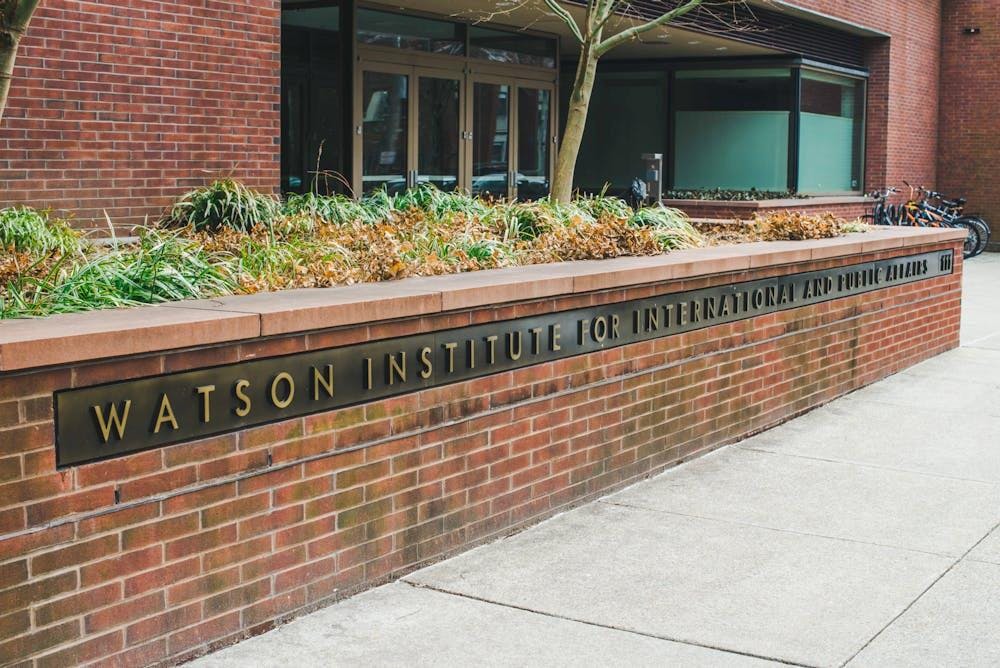On Monday, Firas Maksad — managing director for Middle East and North Africa practice at Eurasia Group, a political risk consultancy firm — discussed the future of Lebanon and the Lebanese people following the 2024 ceasefire between Hezbollah and Israel.
The event, titled “A New Lebanon Faces a New World,” was organized by the Center for Middle East Studies in partnership with the Arab Society.
Maksad started by discussing the unique opportunity that Lebanon has to introduce “meaningful structural reform” to its political system.
“There’s a lot at stake for Lebanon, but also for the traditional political class that has governed it pretty much since its independence,” he said.
Following the recent conflict between Hezbollah and Israel — including the assassination of Hezbollah leaders by Israeli forces last year — the nation sits at a crossroads, Maksad added.
Hezbollah faces a complex history as both a U.S.-designated terrorist group and a political party, Maksad explained. It first emerged in Lebanon in the early 1980s, in the middle of the Lebanese Civil War, as an anti-Zionist Shia militant group.
Hezbollah at the time “was first and foremost a form of resistance against Israel, but also power projection on behalf of Iran,” according to Maksad.
Hezbollah began to operate as a political party in the 1990s, first participating and gaining seats in the Lebanese Parliament following the 1992 election.
The talk then transitioned to the surprise candidacy and election of Prime Minister Nawaf Salam this January. He was previously Lebanese ambassador to the United Nations and president of the International Court of Justice. Salam also was Maksad’s professor during his time as a student at the American University of Beirut more than two decades ago.
Maksad cast doubt on Salam’s ability to usher in a new period of Lebanese politics.
“As well intentioned as the prime minister is, he is up against a daunting task,” Maksad said. “It was very clear in the government formation process that the traditional Lebanese parties were able to reassert themselves rather than establish a government of pure and capable technocrats.”
Maksad argued that despite the prime minister’s “good intentions,” he could not unilaterally fix corruption in the Lebanese government and prevent politicians from “skimming off the top” of funding allocated for rebuilding the country following the ceasefire between Israel and Hezbollah.
Maksad then pivoted to the presidential election of Joseph Aoun earlier this year, a position that had been vacant since 2022.
“Lebanon was able to put an end to a vacuum in the presidency,” he said, which he attributed to “the balance of power that has shifted in the region.”
But he said that “differences that seem to be emerging” between Salam and Aoun that raises questions about “who is a true reformer and whether actual reform is possible.”
Also central to the discussion were the perspectives of the Lebanese population and how they view the future, considering the devastation of towns and homes in southern Lebanon during the war.
Maksad said that during his last visit to Lebanon late last year, he was struck by a “sense of optimism” among the public, which is evenly divided between Sunni Muslims, Shia Muslims and Christians. But he also pointed out that different religious demographics have different expectations following the destruction of southern Lebanon.
“A significant portion of that Shia population is supportive of Hezbollah and the war has left them devastated,” he said. “The assassination of Hezbollah leader Hassan Nasrallah, an iconic and charismatic figure … for his supporters, is a generational blow to the community’s perception of itself.”

Ian Ritter is a senior staff writer covering graduate schools and students. He is a sophomore from New Jersey studying Chemistry and International and Public Affairs. When he’s not at the Herald, you can find him playing clarinet or explaining the rules of kickball to confused listeners.





